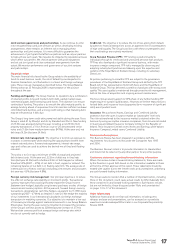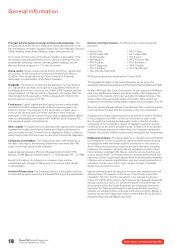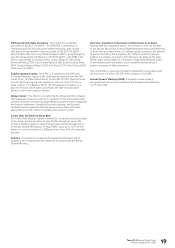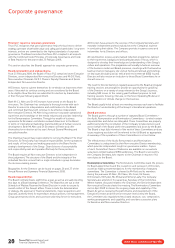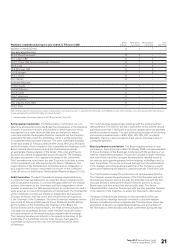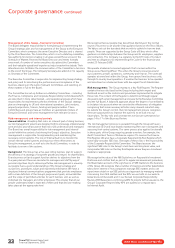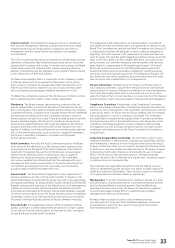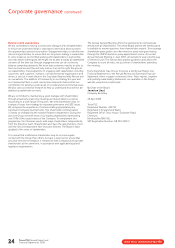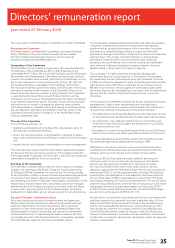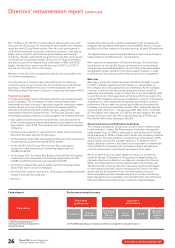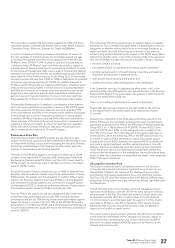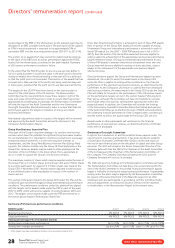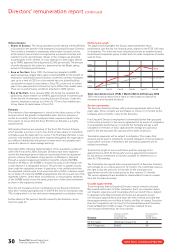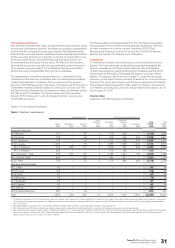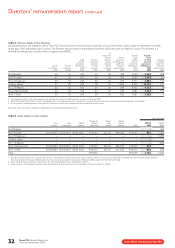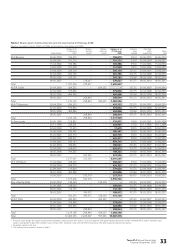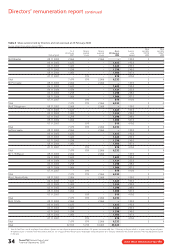Tesco 2008 Annual Report Download - page 27
Download and view the complete annual report
Please find page 27 of the 2008 Tesco annual report below. You can navigate through the pages in the report by either clicking on the pages listed below, or by using the keyword search tool below to find specific information within the annual report.
Tesco PLC Annual Report and
Financial Statements 2008 25
This is the report of the Remuneration Committee on behalf of the Board.
Remuneration Committee
The Remuneration Committee (the Committee) is governed by formal
Terms of Reference. They are reviewed annually and are available
from the Company Secretary upon request or can be viewed at
www.tesco.com/annualreport08/boardprocess.
Composition of the Committee
The Committee consists entirely of independent Non-executive Directors.
The members of the Committee are Mr C L Allen (Chairman of the
Committee), Mr R F Chase, Mrs K Cook, Mr E M Davies and Dr H Einsmann.
No member of the Remuneration Committee has any personal financial
interest in the matters being decided, other than as a shareholder, nor any
day-to-day involvement in running the business of Tesco. Mr J M Lloyd,
the Company Secretary, is Secretary to the Committee. Mr D E Reid,
Non-executive Chairman, and Sir Terry Leahy, Chief Executive of the Group,
both attend meetings at the invitation of the Committee. They are not
present when their own remuneration is being discussed. The Committee
is supported by the Group Personnel and Finance functions and has
continued to use the services of Deloitte & Touche LLP whom it appointed
as an external, independent advisor. Deloitte & Touche LLP also provided
advisory services in respect of corporate tax planning, share schemes,
international taxation, corporate finance and treasury to the Group during
the year. Members’ attendance at Committee meetings is listed in the
Corporate Governance section on page 21 of the Annual Report and
Financial Statements 2008.
The role of the Committee
The Committee’s purpose is to:
> determine and recommend to the Board the remuneration policy for
the Chairman and Executive Directors;
> ensure the level and structure of remuneration is designed to attract,
retain, and motivate the Executive Directors needed to run the Company;
and
> monitor the level and structure of remuneration for senior management.
The Committee also ensures that the remuneration relationship between
the Executive Directors and senior executives of the Company below this
level is appropriate. In particular, the Committee is advised of any exceptional
remuneration arrangements for senior executives.
Activities of the Committee
The Committee normally meets at least four times a year and circulates
minutes of its meetings to the Board. During the financial year ending
23 February 2008 the Committee met seven times. The rolling schedule
for the Committee includes: a review of overall remuneration arrangements;
an overview of best practice; Executive salary and total remuneration
benchmarking; the review of Chairman’s remuneration; consideration of the
relationship of reward between Executive Directors and senior managers;
determining the level of awards and grants to be made under the Group
incentive plans; agreeing targets for the forthcoming year; considering
feedback from shareholders; and an annual review of its own effectiveness.
Executive Directors’ remuneration policy
Tesco has a long-standing policy of rewarding talent and experience.
We also seek to provide incentives for delivering high growth and high
returns for shareholders. The Committee believes that a significant
proportion of total remuneration should be performance-related and
delivered largely in shares to closely align the interests of shareholders
and Executive Directors. In determining the balance between the fixed
and variable elements of the Executive Directors’ remuneration packages,
the Committee has regard to both policy and market practice.
The remuneration strategy for Executive Directors and other key executives
is tailored to emphasise the delivery of strong year-on-year earnings
growth as well as sustained performance in the longer term. Long-term
performance is rewarded through delivery of shares and short-term
performance through a combination of cash and an element of compulsory
deferred shares. This ensures continued emphasis on strong annual
performance combined with long-term executive share ownership,
providing a strong link between the incentives received and shareholder
value delivered. A diagram illustrating the balance between fixed and
variable reward is shown later in this report on page 26.
Tesco operates in a highly competitive and rapidly changing retail
environment. Business success depends on the talents of the key team,
but outstanding business performance comes from teamwork. Tesco has
a stable and successful management team and building and retaining that
team at senior levels within Tesco is important to our continued success.
We believe our incentives should support the continued progress within
the existing business, the strengthening of our returns from the International
business and the creation of significant new businesses, such as the
US venture.
In the past year the Committee reviewed the Group’s existing remuneration
arrangements in light of these requirements and concluded that a
rebalancing of incentives was required, which resulted in the introduction
of several new elements to the Executive remuneration structure:
> the establishment of a Group New Business Incentive Plan which focuses
on long-term business development (four to seven years into the future);
> the introduction of an additional element into our current three-year
Performance Share Plan which targets the performance of our existing
international business; and
> the adoption of a new US Long-Term Incentive Plan for our US Executive
team to ensure that we can attract great talent to build our US business.
The Group New Business Incentive Plan and the US Long-Term Incentive
Plan were both approved by shareholders at last year’s AGM.
Participation in the various elements is governed by the Remuneration
Committee and individual Executives are awarded incentives under the
elements which are most relevant to their sphere of responsibility.
The Group CEO, Sir Terry Leahy, has responsibility for delivering the
continued success of our core business, developing our international
business and also laying the foundations of major new businesses.
His incentives therefore reflect these three responsibilities: the core
reward; an award under the Performance Share Plan focused on improving
international ROCE; a one-off award under the new Group New Business
Incentive Plan; and participation in a New Business short-term bonus for
the next three years of 50% of salary based on achievement of financial
and strategic milestones for new business development. The one-off award
under the Group New Business Incentive Plan will only pay out in full if both
challenging new business performance targets over the period 2010/11
to 2013/14 are met and stretching Group and international ROCE targets
are also met over the periods 2007/8 to 2011/12.
The US venture is currently the most developed new business initiative with
significant opportunity to generate long-term shareholder value. Sir Terry
Leahy is the architect of the concept and format of the new US business,
and his continued leadership and drive are critical to the success of this
start-up business. Payment of his award under the Group New Business
Incentive Plan will therefore initially be focused on the new US business;
however, the Remuneration Committee will have flexibility to consider and
include other new business development opportunities within the proposed
structure, if appropriate.
Directors’ remuneration report
year ended 23 February 2008




